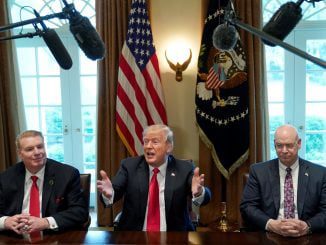One thing we should all be able to agree upon is that one major function of government is to protect the safety and health of all Americans. Without the government, we would often be on our own against what economists and scientists call “negative externalities” — when a third party is affected by something of which they have no control and derive no benefit, like second-hand smoke or a loud party next door.
The cost of COVID-19 will surely stand as the most extensive, and expensive, negative externality the U.S. economy has experienced since the Spanish Flu pandemic of 1918. While the source of this negative externality — Chinese “wet markets” selling often-contaminated wildlife — is not directly under U.S. control, our government still has the responsibility to protect its citizens.
Government-regulated protective systems are designed to protect the public from dire consequences such as explosions, pollution or leakage by interrupting potentially disastrous event chains. Protective systems are typically a complex network of people and technologies that are jointly owned and managed by private enterprise and government. These systems act as circuit-breakers following detection of a seemingly innocuous initiating event, such as a gas leak, which prevents enormous physical and financial costs to the public.
Today we are facing an unprecedented negative externality with COVID-19. China’s poorly- maintained and largely unregulated food supply chain became the source of a zoonotic initiating event when the virus jumped from one species to humans. The world has discovered that its protective systems are ill-prepared for this global pandemic. The risk exceeded our preparedness to manage it.
The Chinese wet markets have been a source of concern for some time now. Scientific papers were written about the dangers of Chinese wet markets as far back as 2007. Wild live animals from bats to pangolins to snakes are sold to the Chinese public without ever passing through any sort of inspection system or food safety regulatory agency in China.
The United States has been aggressive with its domestic regulatory oversight of food preparation and the food supply chain. By comparison, foodborne illnesses in the United States are relatively uncommon, and zoonotic events originating in its food supply chain are virtually unheard of.
Yet, zoonotic events originating from risky foreign food production practices has, for decades, impinged on our collective health and safety domestically, as the SARS, MEERS and H1N1 in 2009 outbreaks have proven. While the United States has no direct regulatory oversight authority beyond its borders, we are not powerless to affect better production practices and mitigate risk.
Trade agreements offer the only practical leverage of bringing hazardous production operations up to acceptable risk profiles. Discussions of the “real cost” of trade must include the risk associated with profound negative externalities imposed upon U.S. citizens as proven with COVID-19.
We must insist in eliminating the risk of wet markets to our future health in the current U.S.-China trade negotiations.
A hard lesson learned from COVID-19 should be that the cost of doing future business with China will be transparent verifiable regulation of “wet markets” and the dangerous supply chains feeding them in China, much like the U.S. insists on verification of nuclear weapons in any proliferation treaty.
Any reasonable regulations on wet markets, enforceable as law and verifiable by U.S. food safety experts and practices, would ensure that Chinese enterprises will pose a minimal level of risk to the public in the future.
Common-sense business practice understands that we do not live in a world that is 100% risk free. It is important to understand that the efficacy of protection is not simply a matter of designing comprehensive and reliable circuit breakers after the fact. We have to be proactive and mitigate future initiating events, such as we are witnessing with COVID-19, so that they occur as infrequently as possible.
Shutting down the wet markets in China should be at the top of the list in the current trade negotiations.
Dr. Martin Wortman is co-director of the Center for Public Awareness and Understanding of Hazardous Technology Risks in Houston, Texas. He holds Ph.D. degrees in engineering and applied mathematics (Virginia Tech), received BS and master’s degrees at NC State and grew up in Durham.
Frank Hill contributed to this article.


